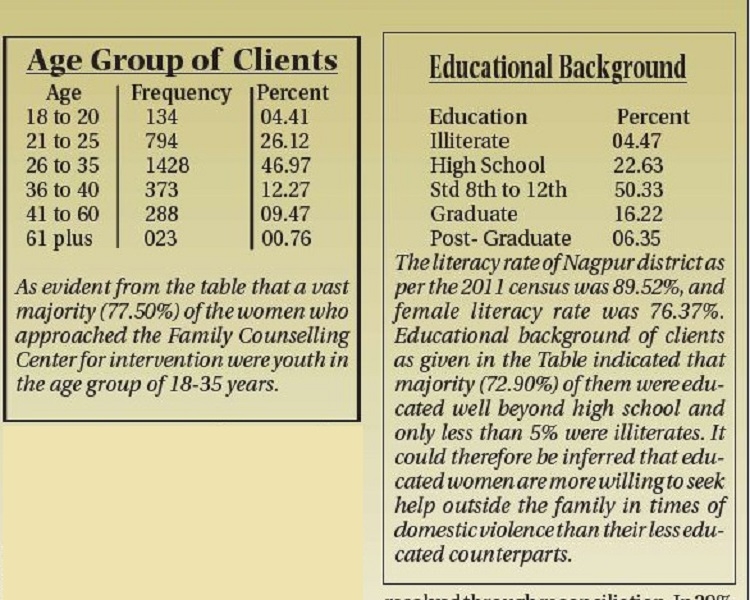Social work intervention, an effective way to support domestic violence victims
| Date :28-Apr-2019 |

By Ajay Mardikar:
Domestic violence, especially in the Indian context, has by and large been a gender-specific crime inflicted by men on women. The unequal gender relation in the family, which is a sad reality in India even today, needs to be acknowledged while approaching the issue of domestic violence. The principle of gender equality is enshrined in the Constitution of India in its Preamble, Fundamental Rights, Corresponding Duties and Directive Principles. In order to uphold and implement this constitutional mandate, the State has enacted various laws and taken measures intended to ensure equal rights, check social discrimination and various forms of violence and atrocities. Nonetheless, a closer look at crime statistics would testify that various types of crimes against women, both within and outside family, continue to be on the rise causing concern in India.

Delhi Union Territory had reported the highest crime rate in India under ‘Crimes against Women’ during the year 2015, followed by Assam (148.2), Telangana (83.1), Odisha (81.9), Rajasthan (81.5), Haryana (75.7) and West Bengal (73.4). Nagaland had the lowest rate of ‘Crime against women’. Dr John Menachery, Principal of Matru Sewa Sangh Institute of Social Work, Nagpur, presented a research paper during a national seminar, recently. Besides providing information about incidents of crime against women, he has elaborated impact of Social Work Intervention in reducing crime against women. The major reference is of information available with Family Counselling Centre (FCC) of the Institute.
During discussion with ‘The Hitavada’ he has stated that the concept of social work intervention to alleviate victims of domestic violence was first experimented by Tata Institute of Social Sciences, Mumbai in 1981. Special cells called Cell for Women in Distress was opened at the office of the Commissioner of Police. The experiment was followed initially in major cities in Maharashtra and later across the State. MSSISW in collaboration with Police Commissioner Nagpur started campaign in this direction in 1998. The Family Counselling Centre intervened in reported cases of domestic violence. Several other social organisations joined hands to open such cells in almost all the police stations in the city. Dr Menachery has stated that it is a widely acknowledged fact that cases of violence at home, mainly against women and children, are more often hushed up within the four walls of the home. This is one category of offence where there is gross ‘victim non-reporting’.
The low rate of conviction in such cases was yet another reason for non-reporting. One of the most important steps in bringing the issue of domestic violence from the private sphere to the public sphere is for emphasizing its inherent criminal content instead of treating it as an exclusively internal family matter. Keeping it within the family not only makes it less amenable to legal intervention, but it also prevents women from seeking relief.
To that end, section 498 A and DV Act have helped in criminalising domestic violence. It is a fact that the strong deterrent value of Section 498A, later on the DV Act and the police is a prime reason for women victims to seek help from an Family Counselling Centre located in a police station. Since its inception in 1998 till Dec 2018, , a total of 3040 cases have been registered at the MSSISW-FCC, which averages 160 cases each year. An analysis of these cases on seven different parameters, namely, Age, Educational Background, Religion, Caste Category, Elapse of Time after Marriage, the Presenting Problems, and the Outcome of Intervention has been made here for the purposes of this research paper. The case records of the FCC were the source of data for this analysis.
Outcome of Social Work Intervention As indicated earlier most of the women victims of domestic disharmony who approached the FCC wanted help in resolving their family problems so that they could prevent family breakup and keep the family intact. The clients were mostly looking for intervention which would ensure that they get their respect from their husbands and put an end to physical/emotional abuse. They wanted help from Social Workers for behavior modification of their husbands so that they would treat their families better.
Only if this was not possible would they want intervention of the police or court. More than 50% cases have been resolved through reconciliation. In 20% cases reference was made to police or court. It has been adequately indicated that social work intervention is important and easier method of resolving cases of domestic violence. Similar such information should hep the policy makers to support social work profession and education in it. Dr Menachery has also analysed the information based on caste and elapse of period for reporting the cases. Majority of the cases are reported within 1 to 5 years of marriage.